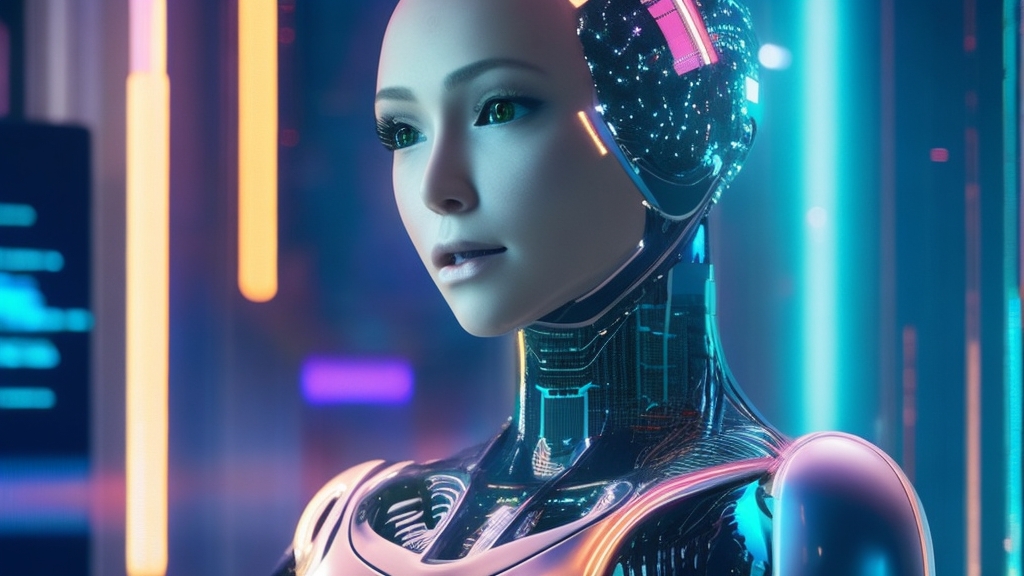AI in Content Integration
In recent years, artificial intelligence (AI) has revolutionized many industries, and content creation is no exception. AI has become an integral part of content integration, providing businesses with innovative solutions for creating, processing, and analyzing content. This article will explore the concept of AI in content integration, its role in modern content creation, the importance of AI in content strategy, and the current trends in AI and content integration.
The Concept of AI in Content Integration
AI in content integration refers to the use of machine learning algorithms and natural language processing techniques to enhance the way businesses create, manage, and distribute content. By leveraging AI, businesses can automate various aspects of the content creation process, improve content quality, and gain valuable insights into audience preferences and behaviors.
The Role of AI in Modern Content Creation
In today's fast-paced digital world, content creation has become more demanding than ever. Businesses need to produce vast amounts of content across different platforms while maintaining high quality and relevance. AI plays a vital role in simplifying and accelerating the content creation process by automating repetitive tasks, providing intelligent suggestions, and analyzing data to inform content strategies.
The Importance of AI in Content Strategy
Content strategy is an essential component of any successful marketing or communication effort. AI enables businesses to develop data-driven content strategies by analyzing user data, identifying patterns, and predicting audience preferences. By leveraging AI-powered content intelligence platforms, businesses can optimize their content strategies, deliver personalized experiences, and achieve better engagement and conversions.
Current Trends in AI and Content Integration
The field of AI in content integration is constantly evolving, with new technologies, tools, and approaches emerging. Some of the current trends in AI and content integration include:
-
Natural Language Processing (NLP) advancements: NLP enables machines to understand, interpret, and generate human language, allowing businesses to automate content creation, improve language translation, and enhance voice recognition systems.
-
Content optimization through AI: AI algorithms can analyze vast amounts of data to optimize content for search engines, improve readability, and enhance user experience. From automated content generation to dynamic content personalization, AI can take content optimization to new heights.
-
AI-powered content analytics: AI algorithms can process large volumes of data to derive valuable insights about audience preferences, behavior patterns, and content performance. This allows businesses to make data-driven decisions and refine their content strategies for better results.
Understanding Microsoft Syntex: A New Era of Content AI
Microsoft Syntex is a groundbreaking AI-driven content management solution that has the potential to revolutionize the way businesses create and process content. This section will provide an overview of Microsoft Syntex, discuss how it transforms content creation and processing, explain the role of cloud technology in Microsoft Syntex, and delve into the impact of Microsoft Syntex on workflow automation.
Overview of Microsoft Syntex
Microsoft Syntex is an AI-powered content management solution built on the Microsoft 365 platform. It leverages machine learning models to extract information, recognize patterns, and automate content processing tasks. By analyzing data from various sources, Syntex helps businesses classify, tag, and organize content more efficiently, making it easier to find and use.
How Microsoft Syntex Transforms Content Creation and Processing
Microsoft Syntex brings automation and intelligence to the content creation and processing workflow. It uses AI models to extract key information from documents, images, and videos, helping businesses automate tasks such as content tagging, metadata extraction, and content categorization. This not only saves time and effort but also improves content accuracy, consistency, and discoverability.
The Role of Cloud Technology in Microsoft Syntex
Microsoft Syntex capitalizes on the power of cloud technology to deliver a scalable, secure, and accessible content management solution. By utilizing cloud-based infrastructure, businesses can leverage the processing power and storage capacity required for AI-driven content integration. Cloud technology also enables real-time collaboration, seamless content sharing, and easy integration with existing systems.
The Impact of Microsoft Syntex on Workflow Automation
With its AI capabilities, Microsoft Syntex enables businesses to automate repetitive and time-consuming tasks in their content creation and processing workflows. From document understanding and extraction to content classification and workflows automation, Syntex streamlines content-related processes, reducing manual effort and human error. This allows content creators to focus on higher-value tasks, such as content ideation and strategy, leading to increased productivity and efficiency.
Applications of AI in Content Creation
AI has proven to be a game-changer in content creation, providing businesses with innovative tools and techniques to overcome challenges, enhance creativity, and improve efficiency. This section will explore various applications of AI in content creation, including audience analysis and topic suggestion, overcoming creative blocks, meeting tight deadlines, and successful case studies of AI applications in content creation.
AI for Audience Analysis and Topic Suggestion
One of the key benefits of AI in content creation is its ability to analyze audience behavior, preferences, and trends. By leveraging AI-powered analytics, businesses can gain insights into their target audience, understand their interests, and identify content gaps or opportunities. AI algorithms can also suggest relevant topics, keywords, and content formats based on the analysis of user data, allowing businesses to create more engaging and personalized content.
The Role of AI in Overcoming Creative Blocks
Creativity is at the core of content creation, but even the most talented content creators face creative blocks from time to time. AI can help overcome these blocks by providing inspiration, generating ideas, and assisting in content generation. Content intelligence platforms powered by AI can analyze massive amounts of data, identify patterns, and suggest creative angles or approaches that humans might not have considered.
How AI Helps in Meeting Tight Deadlines
Meeting tight deadlines is a common challenge in the content creation industry. AI can help businesses deliver quality content on time by automating time-consuming tasks, such as content generation, proofreading, and editing. AI-powered tools can also assist in content planning and scheduling, ensuring that the right content is delivered to the right audience at the right time.
Case Studies: Successful AI Applications in Content Creation
Numerous case studies have demonstrated the effectiveness of AI in content creation. For example, Netflix leverages AI algorithms to analyze user viewing habits and preferences, enabling them to recommend personalized content to each user. Similarly, The New York Times uses AI to analyze audience data and customize content recommendations, resulting in higher engagement and subscriptions. These case studies highlight the tangible benefits that AI can bring to content creation and audience engagement.

Generative AI: The Future of Creative Work
Generative AI is an exciting field that holds tremendous potential for transforming creative work, including content creation, marketing, software development, and design. This section will explore the concept of generative AI models, the impact of generative AI on content creation, its applications in various industries, and the future prospects of generative AI in creative work.
Understanding Generative AI Models
Generative AI models, also known as deep learning models, are algorithms that can generate new content, such as images, text, or even music, based on patterns learned from existing data. These models leverage neural networks to understand and mimic human-like creativity, producing content that is indistinguishable from that created by humans.
The Impact of Generative AI on Content Creation
Generative AI has the potential to revolutionize content creation by automating the generation of high-quality, relevant, and engaging content. For example, generative AI models can be used to create personalized product descriptions, social media posts, or even entire articles based on user preferences and historical data. This not only saves time and effort but also ensures consistency and relevancy in content creation.
Generative AI in Marketing, Software, and Design
Generative AI is not limited to content creation; it has applications in various industries. In marketing, generative AI can help businesses create targeted and personalized advertisements, optimizing campaign effectiveness. In software development, generative AI can automate the creation of code, reducing the time and effort required for development. In design, generative AI can assist in creating aesthetically pleasing visuals and layouts, leveraging data-driven insights to enhance user experience.
The Future Prospects of Generative AI in Creative Work
The future prospects of generative AI in creative work are promising. As AI technologies continue to advance, generative AI models will become more sophisticated, enabling businesses to create highly personalized, context-aware content on a massive scale. This will revolutionize the way content is created, consumed, and shared, leading to new creative possibilities and improved user experiences.
The Challenges and Opportunities of AI in Content Integration
While AI offers numerous benefits to content integration, it also poses certain challenges and ethical considerations. This section will discuss the potential challenges of integrating AI in content creation, the ways AI is shaping the future of content marketing, the opportunities for businesses in AI-driven content creation, and the ethical considerations associated with AI in content integration.
The Potential Challenges of Integrating AI in Content Creation
Integrating AI in content creation comes with its own set of challenges. For starters, AI algorithms require a massive amount of data to generate accurate results, which may be a challenge for businesses with limited data resources. Additionally, AI-generated content may lack the human touch, making it challenging to strike a balance between automation and personalization. It is crucial to ensure that AI is used as a tool to enhance human creativity and not replace it entirely.
How AI is Shaping the Future of Content Marketing
AI is reshaping the future of content marketing by enabling businesses to create more personalized, relevant, and engaging content. AI-powered personalization algorithms can deliver customized content recommendations to each user, improving user experience and increasing conversions. AI also allows businesses to automate content distribution, optimize targeting, and enhance content discovery, resulting in better audience engagement and brand loyalty.
Opportunities for Businesses in AI-Driven Content Creation
AI-driven content creation presents exciting opportunities for businesses. By leveraging AI tools and techniques, businesses can automate repetitive tasks, improve content quality, and gain valuable insights about their audience. AI also enables businesses to scale content production, deliver personalized experiences, and optimize content strategies for better results. Embracing AI in content creation can give businesses a competitive edge in today's fast-paced digital landscape.
The Ethical Considerations of AI in Content Integration
As AI becomes more prevalent in content integration, ethical considerations need to be taken into account. AI-powered content creation raises questions about ownership, privacy, and transparency. Businesses need to ensure that personal data is handled responsibly, algorithms are transparent, and biases are mitigated. It is essential to strike a balance between the benefits of AI-driven content creation and the ethical implications to ensure a fair and responsible approach.
In conclusion, AI has transformed content integration, enabling businesses to create, process, and analyze content in innovative ways. From automating tasks, providing intelligent suggestions, and analyzing data to inform content strategies, AI has become an invaluable tool for content creation. Microsoft Syntex, generative AI models, and various AI applications have showcased the power of AI in content creation and its potential to enhance creativity, productivity, and user experience. While AI offers exciting opportunities, businesses must also consider the challenges and ethical implications associated with integrating AI in content creation. By embracing AI responsibly and leveraging its capabilities, businesses can unlock new possibilities and stay ahead in the ever-evolving digital landscape.

AI Tools for Content Creation
AI tools have revolutionized the content creation process, making it more efficient and effective. This section will provide an overview of AI tools in content creation, a case study on how AI tools like ChatGPT aid in idea generation, the role of AI tools in streamlining the research process, and the impact of AI tools on editing and proofreading.
Overview of AI Tools in Content Creation
AI tools in content creation encompass a wide range of applications and functionalities. These tools leverage machine learning algorithms and natural language processing techniques to automate various aspects of content creation, such as generating ideas, conducting research, and improving the quality of content. AI tools have the potential to save time and effort for content creators while enhancing the overall content creation process.
Case Study: How AI Tools like ChatGPT Aid in Idea Generation
ChatGPT is an AI tool developed by OpenAI that utilizes a language model trained on a vast amount of text data. It assists content creators in generating ideas by engaging in interactive conversations. Content creators can input prompts, ask questions, and receive relevant and contextually appropriate responses from ChatGPT. This AI tool serves as a brainstorming partner, providing inspiration and aiding in the ideation process.
The Role of AI Tools in Streamlining the Research Process
Research is a crucial aspect of content creation, and AI tools can significantly streamline this process. AI-powered tools can analyze and extract information from a plethora of sources, including articles, research papers, and websites. These tools can quickly gather relevant data, identify key insights, and provide content creators with a consolidated and organized research output. The use of AI tools for research ensures that content creators have access to accurate and up-to-date information, saving them time and effort in searching for relevant content.
The Impact of AI Tools on Editing and Proofreading
AI tools have drastically improved the editing and proofreading stages of content creation. These tools utilize language models and advanced algorithms to detect grammatical errors, suggest improvements in sentence structure, and even provide insights on clarity and coherence. AI-powered editing tools can also identify inconsistencies in tone or style and offer alternative word choices. By leveraging AI tools, content creators can enhance the overall quality and readability of their content, ensuring it is error-free and engaging.
Personalization of Content with AI
Personalizing content is essential for engaging with various audience segments. AI plays a crucial role in personalizing content creation by analyzing audience behavior, interests, and preferences. This section will explore personalized content creation with AI, how AI analyzes audience behavior and interests, a case study on Adobe Target for personalized content experiences, and the future of personalized content with AI.
Understanding Personalized Content Creation with AI
Personalized content creation involves tailoring content to meet the specific preferences and needs of individual audience segments. AI tools analyze vast amounts of data, including browsing patterns, interactions, and demographic information, to generate user insights. By understanding audience behaviors and preferences, content creators can develop personalized content that resonates with their target audience, resulting in higher engagement and conversions.
How AI Analyzes Audience Behavior and Interests
AI utilizes machine learning algorithms and predictive modeling techniques to analyze audience behavior and interests. These algorithms can identify patterns and correlations within user data, allowing content creators to understand the topics, formats, and styles that their audience finds most engaging. AI tools can also generate personalized content recommendations based on individual user preferences, ensuring that content is relevant and appealing to each individual.
Case Study: Adobe Target for Personalized Content Experiences
Adobe Target is an AI-powered tool that enables businesses to create highly personalized content experiences. It leverages AI algorithms to analyze customer data and deliver relevant, targeted content to individual users. For example, Adobe Target can provide personalized product recommendations, dynamically adjust content based on user preferences, and optimize content delivery to maximize engagement. This case study showcases how AI enables businesses to deliver personalized experiences that drive customer satisfaction and loyalty.
The Future of Personalized Content with AI
The future of personalized content with AI holds immense potential. As AI technologies continue to advance, content creators will have access to more sophisticated tools and platforms that can generate highly personalized content on a massive scale. AI-powered personalization will extend beyond text-based content to encompass multimedia formats, including personalized videos and adaptive design elements. The integration of AI in personalized content creation will help businesses enhance user experiences, drive conversions, and build stronger connections with their target audience.
AI in SEO and Keyword Research
AI has a significant impact on search engine optimization (SEO) and keyword research. This section will explore the intersection of AI and SEO, how AI streamlines keyword research and clustering, the role of AI in SEO content targets, and future trends in AI-driven SEO.
The Intersection of AI and SEO
The use of AI in SEO has become increasingly prevalent as businesses strive to improve their search engine rankings and visibility. AI-powered algorithms can analyze search engine trends, user behavior, and content relevance to identify the most effective SEO strategies. By leveraging AI in SEO, businesses can gain a competitive edge by optimizing their content for search engines and delivering highly relevant and valuable information to their target audience.
How AI Streamlines Keyword Research and Clustering
Keyword research is a vital component of SEO, and AI algorithms can streamline this process. AI-powered tools can analyze vast amounts of data, including search queries, user intent, and competitor analysis, to identify relevant keywords and phrases. These tools can also cluster keywords based on their semantic similarities, enabling content creators to develop comprehensive keyword strategies that cover a wide range of related topics. AI streamlines keyword research and clustering by providing content creators with data-driven insights and recommendations.
The Role of AI in SEO Content Targets
AI plays a crucial role in setting SEO content targets by analyzing user search intent, relevancy signals, and keyword performance data. AI algorithms can identify gaps in content coverage, suggest new content ideas, and provide guidance on optimizing existing content for better search engine rankings. By leveraging AI in SEO content targets, businesses can ensure that their content is optimized for search engines, meets user expectations, and drives organic traffic to their websites.
Future Trends in AI-Driven SEO
The future of AI-driven SEO holds exciting possibilities. AI technologies, such as natural language processing and machine learning, will continue to advance, enabling businesses to develop more sophisticated SEO strategies. Voice search optimization, personalized search experiences, and predictive search capabilities are some of the future trends in AI-driven SEO. By embracing these trends, businesses can stay ahead of the competition and ensure their content is easily discoverable by their target audience.

AI in Visual and Audio Content Creation
AI has made remarkable advancements in the creation of visual and audio content. This section will explore the rise of AI in visual content creation, AI tools like Deep Dream and DALL-E for image generation, AI in audio and video production overview, and the future of AI in visual and audio content creation.
The Rise of AI in Visual Content Creation
AI has revolutionized visual content creation by enabling machines to generate images, illustrations, and graphics. AI-powered algorithms can analyze and learn from vast amounts of visual data, allowing content creators to generate high-quality visuals that align with their brand and communicate their message effectively. From automated image generation to the enhancement of existing visuals, AI is transforming how visual content is created.
Deep Dream and DALL-E: AI Tools for Image Generation
Deep Dream and DALL-E are two AI tools that have garnered significant attention for their image generation capabilities. Deep Dream utilizes neural networks to generate dream-like images by enhancing and distorting existing images. DALL-E, on the other hand, uses a generative model to create unique images from textual descriptions. These AI tools showcase the potential of AI in visual content creation and its ability to push the boundaries of creativity.
AI in Audio and Video Production: An Overview
AI has also made its mark in audio and video production, both in terms of content creation and post-production. AI algorithms can analyze and enhance audio quality, remove background noise, and even generate realistic speech or music. In video production, AI can automate video editing processes, optimize video quality, and even create deepfake videos. AI-driven audio and video production enhances efficiency and quality, allowing content creators to streamline their workflows and deliver compelling experiences to their audience.
The Future of AI in Visual and Audio Content Creation
The future of AI in visual and audio content creation is promising. As AI technologies continue to evolve, content creators will have access to more advanced tools that can generate highly realistic images, animations, and audio. AI will enhance content creation processes by automating tedious tasks, offering creative suggestions, and adapting content to various mediums and platforms. The integration of AI in visual and audio content creation will open up new creative possibilities and revolutionize how content is consumed.
Ethics and Oversight in AI Content Creation
While AI has brought immense benefits to content creation, ethical considerations and human oversight are crucial to ensure responsible and meaningful AI-powered content. This section will discuss the importance of human oversight in AI content creation, ethical considerations in using AI for content creation, the need for original content to combat plagiarism, and finding the balance between AI assistance and human creativity.
The Importance of Human Oversight in AI Content Creation
Human oversight is essential in AI content creation to ensure that the quality, integrity, and ethical standards of content are maintained. While AI tools can assist in generating content, it is crucial for humans to review, validate, and provide creative input. Human oversight ensures that AI-generated content aligns with brand guidelines, meets ethical standards, and resonates with the intended audience. Content creators must exercise their judgment and expertise to ensure that AI is used responsibly and effectively.
Ethical Considerations in Using AI for Content Creation
Using AI for content creation raises various ethical considerations. It is essential to address issues such as bias, fairness, authenticity, and transparency. AI algorithms should be trained on diverse and unbiased datasets to avoid perpetuating discriminatory or harmful content. Transparency in disclosing AI-generated content should also be upheld to maintain trust and transparency with the audience. Content creators must prioritize ethical considerations and ensure that AI-driven content creation adheres to ethical guidelines and best practices.
Plagiarism and AI: The Need for Original Content
AI-powered content generation raises concerns about plagiarism and the need for original content. While AI tools can assist in generating content, it is crucial to ensure that the content produced is unique, valuable, and respects intellectual property rights. Content creators should use AI as a tool for inspiration and augmentation rather than relying solely on AI-generated content. Originality in content creation is essential to maintain credibility, avoid legal issues, and deliver unique experiences to the audience.
The Balance Between AI Assistance and Human Creativity
Finding the right balance between AI assistance and human creativity is crucial for effective content creation. While AI tools can help automate certain tasks and offer suggestions, human creativity and judgment are invaluable for producing exceptional and emotionally resonant content. Content creators should embrace AI as a tool to enhance their creative processes, constantly exercising their expertise and judgment to ensure the authenticity, uniqueness, and quality of the content they produce. The harmonious collaboration between AI and human creativity can lead to outstanding content that connects with and engages the audience.
In conclusion, AI tools have transformed content creation by streamlining processes, enhancing personalization, and optimizing SEO strategies. AI has also made significant advancements in visual and audio content creation, offering new creative possibilities. However, ethical considerations and human oversight are critical to ensure responsible and meaningful AI-powered content. By leveraging AI tools responsibly and striking the right balance between AI assistance and human creativity, content creators can deliver exceptional content that captivates and engages their audience.

AI Automation Agency Services
AI automation agency services are companies that provide AI-powered automation solutions for various aspects of content creation and distribution. These agencies utilize machine learning algorithms and natural language processing techniques to automate tasks such as content generation, content curation, social media scheduling, and more.
Authority Websites
For authority websites, AI automation agency services can help with content creation by analyzing data and trends to identify topics that resonate with the target audience. AI algorithms can generate high-quality articles based on user preferences, search engine optimization (SEO) requirements, and the latest industry trends. These AI-generated articles can help authority websites maintain a consistent flow of fresh and informative content.
Social Media Posts
In social media posts, AI automation agency services can assist in content creation by analyzing user behavior, location, and preferences to create personalized and engaging content. AI algorithms can generate social media messages or captions tailored to specific platforms based on data-driven insights. This allows businesses to create content that resonates with their target audience and drives better engagement.
Feature Images
Feature images are an essential component of content creation, and AI can play a role in generating visually appealing and relevant images. AI algorithms can analyze the content of the article, keywords, and user preferences to generate custom feature images. By automating the image creation process, AI automation agency services enable businesses to save time and resources while ensuring that the visuals align with the overall content and brand.
AI Driven Apps
AI-driven apps are another area where AI automation agency services can provide value. These apps can leverage AI algorithms to automate content creation, optimize user experiences, and provide personalized recommendations. AI-driven apps can analyze user data, preferences, and behavior to deliver customized content and features, improving user engagement and satisfaction.
Overall, AI automation agency services play a crucial role in streamlining content creation and distribution processes. By leveraging AI technologies, businesses can automate repetitive tasks, generate personalized content, and optimize content strategies. These services enable businesses to stay competitive in the fast-paced digital landscape and deliver quality content that engages and resonates with their target audience.

FAQs
What are the main benefits of using AI in content creation?
AI offers several benefits in content creation, including:
-
Automation: AI can automate repetitive tasks in content creation, such as generating ideas, conducting research, and proofreading, saving time and effort for content creators.
-
Improved Efficiency: AI-powered tools can streamline workflows, optimize processes, and provide intelligent suggestions, resulting in increased efficiency and productivity.
-
Personalization: AI can analyze audience behavior and preferences to deliver personalized content, enhancing user experiences and driving higher engagement and conversions.
-
Enhanced Quality: AI algorithms can analyze and improve content quality, including grammar, clarity, and coherence, ensuring that the produced content is error-free and engaging.
-
Data-driven Insights: AI tools can analyze large amounts of data to provide valuable insights into audience preferences, content performance, and trends, enabling content creators to make data-driven decisions and refine their strategies.
Can AI replace human creativity in content creation?
No, AI cannot replace human creativity in content creation. While AI can assist in generating ideas, providing suggestions, and automating certain tasks, human creativity is essential for crafting unique, emotionally resonant content that connects with the audience. AI tools should be seen as tools to enhance human creativity and increase productivity, rather than replacing it entirely. The collaboration between AI and human creativity can result in outstanding content that combines the best of both worlds.
How can AI help with content personalization?
AI can help with content personalization by analyzing audience behavior, interests, and preferences. By leveraging AI-powered tools, businesses can gather and analyze data on individual users to deliver personalized content recommendations, tailored to their specific needs and preferences. AI algorithms can identify patterns, make predictions, and provide content creators with insights into the topics, formats, and styles that resonate most with their target audience. This enables content creators to deliver relevant and engaging content that enhances user experiences and drives higher engagement and conversions.
What are the potential ethical considerations in using AI for content creation?
Ethical considerations in using AI for content creation include:
-
Bias and Discrimination: AI algorithms must be trained on diverse and unbiased datasets to avoid perpetuating discriminatory or harmful content.
-
Transparency: It is important to disclose AI-generated content to the audience to maintain transparency and trust. Users should be aware that they are interacting with AI-generated content.
-
Intellectual Property Rights: Content creators should ensure that AI-generated content respects intellectual property rights and does not infringe upon copyrighted material.
-
Authenticity and Plagiarism: AI-generated content should be unique and original, avoiding plagiarism and respecting the work of others.
Content creators must prioritize ethical considerations and adhere to ethical guidelines and best practices when using AI in content creation to ensure responsible and meaningful content generation.
What is the future of AI in content creation?
The future of AI in content creation is promising. As AI technologies continue to advance, content creators will have access to more sophisticated tools and platforms that can streamline processes, enhance personalization, and optimize content strategies. AI-powered content creation will become more prevalent, enabling businesses to create highly engaging and personalized content experiences for their target audience. The integration of AI in visual and audio content creation will open up new creative possibilities. However, human oversight and creativity will remain essential in ensuring the quality, authenticity, and ethical standards of content creation. The harmonious collaboration between AI and human creativity will lead to the continued evolution and improvement of content creation processes.


